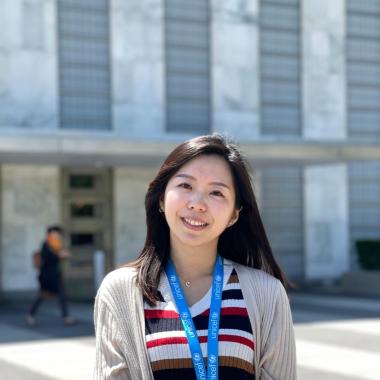
Global Public Health Nutrition MSc – 2018
In this comprehensive course, we didn't adhere to the notion that "every country should follow a specific model". Instead, we analysed each case based on its local context, drawing on valuable insights from experienced supervisors and classmates from diverse backgrounds; this approach has been a highlight.
Why did you choose the University of Westminster?
I aspired to work as a nutritionist, specifically to aid malnourished children in developing countries. This field requires a profound understanding of both Public Health and Nutrition, and only a few universities offered courses in this area and with a global focus. I chose the University of Westminster because the course team here possess rich experience not only in academia but also in the field and frontline.
How has your experience been studying in London?
Studying in London has been one of the best decisions of my life. The city facilitates easy connections with like-minded students from various universities. I loved living in the heart of the city, which made it very easy for students to engage in numerous activities. Living here, I've enjoyed exploring cafés for study sessions, discovering the UK countryside on weekends, and even travelling to Europe during holidays.
What have you particularly enjoyed about your course?
The Global Public Health Nutrition MSc course covers clinical nutrition, policy, and governance, aiming to equip students with the knowledge to establish robust nutrition systems in countries. In this comprehensive course, we didn't adhere to the notion that "every country should follow a specific model.". Instead, we analysed each case based on its local context, drawing on valuable insights from experienced supervisors and classmates from diverse backgrounds; this has been a highlight.
How have you found academic support as part of your studies?
The support from our professors, especially the course leader, who encouraged us to voice any questions or comments, was invaluable. Coming from a culture where public speaking isn't prevalent, this encouragement boosted my participation and learning.
Are there any stand-out facilities associated with your course?
During my studies, I stayed in student accommodation, which provided close access to the student library. As a student, I also appreciated the abundance of study spaces around the campuses!
Tell us about your experience of using the University Careers and Employability Service.
The university introduced me to a Career Mentor who is a Nutrition Manager at Save the Children in Senegal, who has inspired me to pursue this career. Now, I work in the same country as her, serving as a Nutrition Officer at UNICEF.
Tell us about any activities that you have undertaken outside of your course
Participating in a short summer course on Nutrition in Emergencies allowed me to meet other students who worked for organisations like the UN and international NGOs.
What would your advice be to someone considering studying at Westminster?
I encourage future students to make the most of the opportunities and not forget to stop and smell the roses. Make sure to appreciate the whole journey!
What's the best aspect of being a University of Westminster student?
While life in London and the academic workload can be overwhelming, enjoying the surroundings is essential. With supportive supervisors, diverse classmates, and the vibrant city of London, this university provides ample opportunities to turn your dreams into reality.